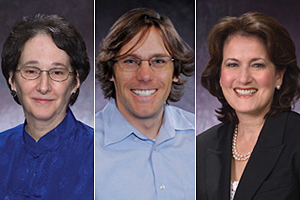Education
Winning a Fulbright Scholar Award

The Fulbright U.S. Scholar Program provides wonderful opportunities for researchers, lecturers, and administrators to work abroad, but the culturally enriching benefits of the experience are equally valuable.
That’s what faculty and administrators attending a November 3 campus presentation featuring Fulbright officials learned from their colleagues who have benefited from winning Fulbright grants.
“Presentations on the Fulbright and similar programs are critical to enhancing faculty and staff knowledge of the supports that are available to transform their career opportunities, as well as the scope of people globally who know and are influenced by the research and teaching they conduct at AU,” said Jonathan Tubman, vice provost for graduate studies and research.
The stars of the show were former Fulbright award winners, faculty members Naomi Baron, executive director of the Center for Teaching, Research and Learning and a professor in the College of Arts and Sciences’ Department of Language and Foreign Studies, and Nathan Harshman, a professor in CAS’s Department of Physics.
Baron, an authority on online and mobile communication use, was a Fulbright fellow in Sweden in fall 2007. Teaching in Gothenburg gave her great opportunities to do cross-cultural research.
Gothenburg, Sweden
“The real highlight,” Baron said, “was two days before I left the country, December 13, which is a very special day in Sweden, Santa Lucia Day, [the Swedish Fulbright commission] had arranged for the Fulbright scholars from the United States to go to the Nobel Prize ceremony in Stockholm. That is an experience I will not forget.”
Living in Sweden had a profound impact on her in other ways as well.
“So what did I learn? What I learned is that which is familiar is still different . . . But the longer I was in Sweden the more it was clear to me that I had so much to learn about cultural differences.”
People were quieter on the streets of Gothenburg; they didn’t talk as much as she was used to. She learned that it was okay to talk on a cell phone on a tram, but not on a train. And that “a working lunch was an oxymoron.” Mixing lunch and business was not done.
“What Sweden gave me was a heightened awareness of cultural nuance,” said Baron. “Upon returning to the United States, I recycled more, I did walk more, and I think I have found a newfound appreciation for the richness and the subtlety of human possibility.”
Trento, Italy
Harshman’s Fulbright took him to the University of Trento, Italy, for research and to teach a class on group theory in quantum mechanics. His research focuses on the intersection of particle physics and quantum information theory.
“The research environment was great,” Harshman said, speaking of the program’s benefits. “Between the faculty at physics [and] an institute for nuclear physics there, a pan-European institute for nuclear physics, there were over 100 physicists there. There was something going on all the time. And that’s not counting the graduate students, the undergraduates. It was very, very refreshing for me to go to this place and have this change of pace.”
The experience encouraged productivity.
“While I was in Trento I submitted three articles, and the work that I started there I’m still processing in some sense . . . In fact my goal for the rest of 2011 is to write a review article called ‘Entanglement and the Quantum 2-Body Problem.’ Well, that’s the problem that in some sense I solved . . . in Trento.”
In Trento, Harshman also discovered a looser standard of academic accountability—students were surprised when we handed out a syllabus detailing the semester’s work. And they also seemed shocked that he kept showing up for class.
But living there was an enriching experience—the food, hiking, museums, culture.
And he attended several conferences.
Fulbright Opportunities
The Fulbright U.S. Scholar Program offers about 800 teaching and research grants that last from three months to a year. Opportunities also exist for shorter grants.
Grants are available in more than 125 countries. Most teaching awards require only English language skills, and grantees need not necessarily be specialists in the countries they hope to visit and work in.
“One thing we hear from every Fulbrighter we’ve ever met is how much it changes their life,” Anita McBride, chair of the Fulbright Scholarship Board and executive in residence at AU’s School of Public Affairs, told those attending the event.
“This is a unique program with unique opportunities and it has met the test of time. It has the rigor that one hopes to see in a program like this that is supported by so much of the generosity of the American people.” McBride said award officials asks grant award winners “to be an ambassador of your country, to represent the best of your country when you’re overseas and really pay it forward when you come back.”
The panel also included Jamie Lawrence from the Department of State and Ed Roslof of the Council for International Exchange of Scholars.
The event was sponsored by the Vice Provost for Graduate Studies and Research, the Office of Sponsored Programs, and the Center for Research, Teaching and Learning.
